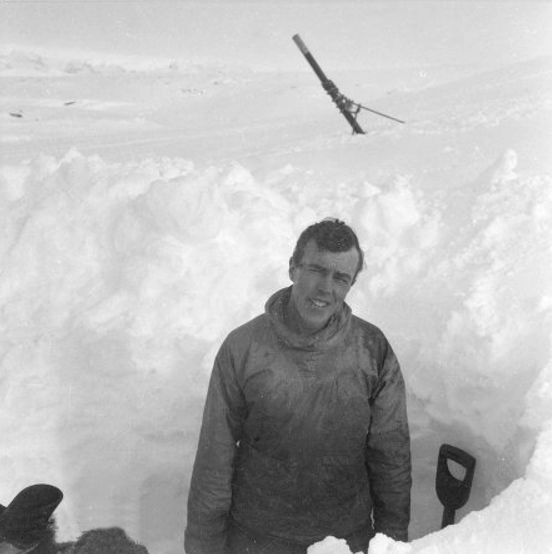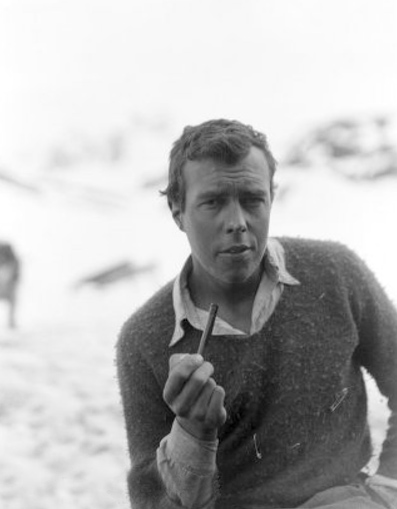![]()
William Launcelot Scott Fleming
(7 August 1906 – 30 July 1990)
|
I decided to put a page up about Launcelot, he was an honorary advisor to the SHS for many years and participated in several expeditions including my 1976 Rhum trip so it seemed fitting to give some information about him. |
|
“Launcelot Fleming was a geologist and also an Anglican priest. At Sir Vivian Fuchs’s suggestion he had been on an expedition to study Vatnajokull in Iceland led by Brian Roberts in 1932 and also on an expedition to study the Ny Friesland ice cap in Svalbard led by A.R. Glen. He had also been a member of the British Graham Land Expedition 1934–37, the first major British expedition since Scott’s last journey in 1911. He was also active in ASSI [Association for the Study of Snow and Ice, later to become the British Glaciological Society, now called the International Glaciological Society], as its publications record. He was subsequently Dean of Trinity Hall in Cambridge and Bishop of Portsmouth.” Reading his wikipedia page and whoswho entry reveals he graduated in Geology from Cambridge University in 1928 before undertaking further study at Yale University as a Commonwealth Fund Fellow (1929–31). He was ordained as a priest in 1934. His early years were spent as chaplain to successive Antarctic expeditions, for which he was awarded the Polar Medal (awarded for extreme human endeavour against the appalling weather and conditions that exist in the Arctic and Antarctic) in 1937. He served as Director of Scott Polar Research Institute between 1937 and 1949. In 1949 he became Bishop of Portsmouth, transferring Sees in 1959 to become Bishop of Norwich. Here is what wikipedia says about him: A great gift for friendship made him outstandingly effective pastorally; he genuinely cared about people. Although Fleming became a bishop without parochial experience or any great gift for preaching, his unassuming friendliness and humility won over clergy and laity. Portsmouth became an exceptionally well-run diocese, with more than its share of young clergy and ordinands. Norwich, with 650 churches and a shortage of clergy, presented greater problems; he tackled them resolutely and imaginatively, developing rural group ministries and again attracting good clergy. He also played a significant part in planning the University of East Anglia (which, unusually, has its own university chapel). He was an uncanny judge of character, excellent in one-to-one situations. His desk might have looked chaotic, but he was a shrewd administrator with a clear grasp of priorities. A remarkable rapport with young people led to his being made chairman of the Church of England Youth Council (1950–61). Struck by a rare spinal disorder, which seriously affected both legs, he resigned the see in 1971. |
|
||
|
|
An eternally enthusiastic man, in 1960 he realized a lifetimes ambition to ride on the footplate of a train and in 1965, at the comparatively advanced age of 58 married Jane Agutter, widow of Anthony Agutter and daughter of Henry Machen, landowner. It was a happy marriage which lasted for twenty-five years but produced no children. In 1968, most unusually for a bishop, Fleming piloted a bill (the Antarctic treaty) through the House of Lords. Well informed on environmental and ecological issues (he was a pre-war glaciologist of repute), he constantly urged responsible stewardship of the world (his maiden speech in the House of Lords was about cruelty to whales), and the need for international co-operation. He became vice-chairman (1969–71) of the parliamentary group for world government, and a member of the government Standing Advisory Committee on Environmental Pollution (1970–73). At Windsor, he consolidated the reputation of St George’s House. His influence on church policy would have been greater but for synodical government: off-the-cuff debate was not his forte. On resigning his Bishopric, Fleming was appointed the Queen’s domestic chaplain and Dean of Windsor, in which capacity he officiated at the funeral of the Duke of Windsor. In 1976 he was awarded an honorary doctorate by the University of East Anglia for his work with young people. He retired to Dorset and died in Sherborne on 30 July 1990. He was cremated and his ashes were interred in the churchyard of All Saints’ Church, Poyntington. Source:- https://sampimentel.wordpress.com/tag/launcelot-fleming/
|
||
 |
Launcelot Fleming British Graham Land Expedition 1934–37 |
 |
|